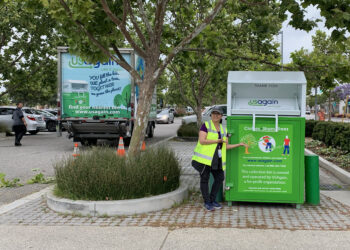A Tennessee lawmaker is reintroducing an extended producer responsibility bill for packaging – with some twists, in an attempt to get it through the Republican-controlled Legislature.
The Tennessee Waste to Jobs Act, sponsored by State Sen. Heidi Campbell, D-Nashville, would put the producer responsibility organization in the driver’s seat for much of the program design and plan targets, Campbell said, unlike in California and other states.
“We’re kind of approaching it a little differently,” she said. “We are really framing this as a business-centric bill, a bill that builds jobs, a bill that brings money into the state and gives us the opportunity to be the lead state in material aggregation and distribution.”
For example, Campbell is focusing on how the Tennessee Waste to Jobs Act will create more than 7,700 good-paying jobs, save municipalities money, entice manufacturers to come to town with access to recycled material, bring an estimated $300 million annually into the state for recycling infrastructure and extend the lives of rapidly filling landfills, which are “this anvil overhead right now,” she said.
Tennessee currently ranks 48th in the nation for recycling, she added, and only 47% of residents have access to recycling services. The TWJA would increase recycling rates by 355% if enacted, Campbell estimated.
At less than 20 pages, the bill leaves most of the rulemaking for after the passage of the bill. The Tennessee Department of Environment Conservation will be overseeing the PRO, as in other states, and will be the ultimate regulatory authority for the bill, providing checks and balances, she added.
“We’ll really be relying upon or empowering business to take the helm with this, and that is something that my colleagues appreciate,” Campbell said.
Due to the PRO-centered approach, brands such as Nestle, Mars, Unilever and Danone are supporting the bill via the Sustainable Food Policy Alliance, she noted, and some companies that want access to more post-consumer material are also early supporters, such as Kaiser Aluminum Corporation.
Campbell said a tweak to this year’s bill is that counties with a population of more than 200,000 will be automatically included, while any counties smaller than that would have to opt in.
Campbell has been working on the bill for two years – and while she filed the bill last year, it was not presented in committee. Tennessee’s 114th General Assembly convenes on Jan. 14, and after the latest version is filed and presented, it will be the first time the bill is officially introduced.
“There is so much preemption in this state that it gives us the opportunity to drive something that has to do with local control,” Campbell said. The opt-in method is also being floated as a compromise on how to expand Medicaid, so Campbell said the modification might help the bill gain more Republican support.
This year’s version also includes compostable packaging, she said, and is permissive, with plenty of compromise.
“You can’t let the perfect be the enemy of the good, so we’re willing to do whatever we can to get the ball rolling with this, with the hopes that we can expand upon it and improve it over time without, quite frankly, some of the mistakes that have been made in other states by being overly prescriptive,” she said. “Basically, let’s do this experiment of a red state and see if the free market driving it actually is effective.”
Campbell said while many people might not look to Tennessee for packaging EPR, “in a lot of ways, this is the perfect scenario.”
“The government needs to get out of the way and let this actually happen,” she said, adding that the lack of prescriptive language is not just to get the bill over the finish line: “Overly regulatory things aren’t very effective sometimes.”
“We’re getting a lot of momentum,” she added, and the changes will hopefully get the bill even more bipartisan support: “We had Republican support in the Senate last time, and so we’re really working on the House right now.”
Last year’s bill, the Waste Reduction and Recycling Act, also got industry support from the Sustainable Food Policy Alliance. It called for the TDEC to maintain a minimum recyclables list.
It tasked the PRO with performing a needs assessment and developing a five-year plan that included a funding mechanism for dues that is modulated based on the recyclability and reusability of materials and the use of recycled content.
Under the old bill, the PRO was also in charge of coming up with a strategy for source reduction, reuse and establishing performance goals for each covered material type at five-, 10-, and 15-year rolling intervals.
Gary Cohen, the volunteer outreach director with Reimagine Packaging Tennessee, told Resource Recycling that much of the work in past years was focused on educating lawmakers about EPR.
“One of the first questions I ask when I sit down with the legislators is do you know what EPR is. They look at me, and they say no,” Cohen said. “You really have to start at the basics.”
However, he thinks that once lawmakers understand the benefits, there may well be interest in exploring EPR for problem materials such as paint, tires and e-scrap.
“Once they understand what EPR is, there’s no end in terms of what we can do,” he added.





























